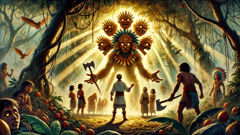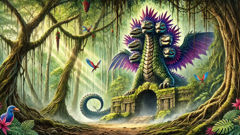Introduction
In the dense, sun-dappled forests of ancient Paraguay, where the mighty Paraguay River wove silver ribbons through emerald foliage, stories moved like whispers on the wind. The Guarani people, keepers of a thousand songs and tales, lived in tune with every breath of the land. They knew that not all mysteries hid in shadows—some roared in the open, their scales glistening under the southern sun. Of all the legends born in those forests, none loomed as large as that of the Teju Jagua, the seven-headed lizard, a creature older than memory and more enigmatic than the moonlit river. Some said his breath carried the scent of ripe fruit; others claimed his roar could split stone. He was guardian of the caves, protector of nature’s bounty, and a living warning to those who forgot the balance between giving and taking. The Teju Jagua’s story was more than a myth; it was a living bond between people and their wild world—a tale mothers whispered to restless children and elders recited as night gathered under the ceiba trees. It spoke of a time when humans and spirits walked side by side, when the world was young and every fruit or flower was a gift to be cherished. In this land where hummingbirds glimmered like jewels and jaguars moved as shadows, a legend was carved deep into the roots, as enduring as the rocks in which Teju Jagua made his home. The tale begins not with the beast himself, but with a young girl named Nanduti, whose courage would awaken the forest and change her people’s fate forever.
The Song of the Forest: Nanduti’s Awakening
Nanduti was named for the spiderwebs that glittered with dew each morning—her mother saw patterns in everything, from the spiral of a fern to the delicate embroidery on a woven basket. As the youngest daughter of her village’s healer, Nanduti grew up between the world of plants and the world of stories. She learned to listen: to the sigh of wind in the ceiba, the hush of river stones, and the cries of monkeys swinging above the thatched roofs. But there was one sound that always drew her away from the firelight and into the green maze—a low, rumbling chant that seemed to rise from the roots themselves.

On the eve of the harvest festival, Nanduti’s curiosity pulled her beyond the edge of her village. The elders had begun their annual offerings to Karai, the spirit of fire, and the forest was alive with laughter, music, and the scent of roasting maize. Yet Nanduti slipped away, following a path only she could hear. She moved quietly, careful not to disturb the nestling birds or frighten the agoutis rustling in the undergrowth. The forest changed as she walked; trunks grew wider, moss thicker, and the air seemed to shimmer with secrets.
She came to a hollow where the ground opened in a yawning cave. Vines trailed down the rockface, and strange flowers—purple and gold—bloomed even in the dim light. A fruit tree heavy with mangoes arched overhead, its roots twining into darkness. The rumble was louder here, vibrating through her bones. Nanduti hesitated. She’d heard stories—frightful tales—of a monster with seven heads, each bearing the face of a dog, each able to sniff out fear or greed. But stories couldn’t bite, she told herself. Stories couldn’t eat you. Still, she crept closer, heart thumping like a hummingbird’s wings.
In the darkness, she saw eyes—seven pairs, gleaming and unblinking. The Teju Jagua filled the entrance, scales overlapping like shields, his dog-heads growling and sniffing the air. He was vast, as long as a river canoe, his tails curling and uncurling with slow menace. Yet something in his gaze was not hunger, but warning. Nanduti didn’t run. Instead, she knelt and placed an offering of honeyed guava on a smooth stone, whispering thanks to the guardian. The beast watched. One head dipped low and licked the fruit, another snorted approval, and a third fixed her with an almost human stare. The forest seemed to hold its breath. Nanduti knew then that the stories were true—Teju Jagua was real, and he watched over more than just caves or fruit; he guarded the fragile boundary between taking and giving. She left quietly, heart pounding but full of wonder.
The next morning, the villagers found her at the edge of the forest, humming the ancient tune she’d heard beneath the trees. Her eyes sparkled with secrets, and from that day on, Nanduti was different. She listened more carefully, spoke less, and carried an unspoken understanding that drew respect from old and young alike. Her mother watched her daughter with pride—and a touch of fear—knowing that those who met the guardian never returned unchanged.
Fruit of the Forbidden Grove
Seasons passed, and Nanduti’s fame grew beyond her village. She became a healer in her own right, trusted with wounds both of the body and the spirit. Yet always she remembered the night she’d met Teju Jagua—the glint of his scales, the intelligence behind his monstrous faces. The forest’s balance depended on respect. But not everyone shared Nanduti’s reverence for the old ways.

A distant village across the river suffered from hunger. Their crops failed, their hunters returned empty-handed, and their children grew thin. Their chief, Yaguareté, was proud but desperate. When he heard rumors of an enchanted grove guarded by a creature of unimaginable power, he gathered his bravest and set out to claim its bounty.
Nanduti heard of their plan through the wind and the birds. She rushed to warn them. “Do not take what is not offered,” she pleaded, “or you will bring misfortune on us all.” But hunger makes men reckless, and Yaguareté scoffed at her warnings. His warriors carried axes, baskets, and blades of bone. They crossed the river at dawn, laughter masking their fear.
The forbidden grove was a wonder—trees dripped with golden fruit, and the air was heavy with sweetness. Yet as they filled their baskets, a chill swept through the clearing. Roots twisted underfoot, and shadows coiled along the trunks. A guttural roar rolled from the mouth of a nearby cave. The ground trembled. Yaguareté and his men froze as Teju Jagua emerged, scales aglow in the dim light, his seven heads barking, growling, and hissing in unison.
The warriors dropped their bounty and fled. Some tripped on roots, others vanished into the dark. Yaguareté, proud and foolish, stood his ground. He raised his axe, but the beast’s heads snapped and circled, weaving a terrible melody of warning and rage. Nanduti arrived, breathless, calling out to the guardian in the old tongue. She knelt, arms outstretched, between chief and monster.
“Guardian of the caves and fruit,” she pleaded, “forgive their hunger. Spare them, and teach us to honor your gifts.”
The Teju Jagua paused. One head licked Nanduti’s cheek; another sniffed her hair; a third fixed Yaguareté with a stare that seemed to strip him of pride and fear alike. Then, with a thunderous snort, the beast retreated into the shadows. The fruit trees shuddered, their branches bending low as if in relief. Yaguareté fell to his knees, humbled.
From that day, the villagers gathered only what they needed, leaving offerings for the guardian. The land healed. The river sparkled. Nanduti’s voice became legend—a reminder that nature’s bounty is a gift, not a right, and that respect is the true measure of courage.
The Secret of the Caves: Lessons in Harmony
Years turned, and Nanduti’s wisdom brought peace to the villages along the river. The Guarani learned to read the forest’s signs: to wait for fruit to ripen, to share water in times of drought, to leave gifts for the guardian whose seven heads never slept. Yet curiosity lingered—what secrets did Teju Jagua’s caves hold? What treasures or terrors did he guard so fiercely?

One day, a band of children disappeared while foraging. Their frantic parents came to Nanduti, desperate for help. She listened to the river’s song and heard a strange note—a cry muffled by stone. Guided by instinct and memory, Nanduti followed winding paths into the hills. The air grew cool, and moss softened her steps. Deep in a hidden hollow, she found the mouth of a cave, its entrance shrouded in mist.
Inside, the darkness pressed close. Water dripped from unseen heights; roots hung like silent bells. Nanduti called out softly, singing a lullaby her mother had taught her. The cavern echoed with her voice—and with the distant sound of whimpers. Seven sets of eyes gleamed in the darkness. Teju Jagua crouched low, massive yet strangely gentle. Around him, the missing children huddled, wide-eyed but unharmed.
The guardian watched Nanduti approach. One head nuzzled a crying boy; another nudged a frightened girl toward the entrance. The children had wandered too close and fallen into a crevice; Teju Jagua had found them and kept them safe, shielding them from jaguars and the cold.
Nanduti bowed in gratitude, whispering words of thanks. She led the children home, her heart brimming with awe. That night, as the moon rose over the forest, she told her people what she’d seen: “The caves hold not gold or jewels, but safety. Teju Jagua protects what is lost—children, balance, hope.”
The villages flourished. Elders wove new tales into their songs: stories of a monstrous guardian who was both terror and blessing; of a healer who bridged the worlds of spirit and earth; of harmony restored by listening—to each other, to nature, to the ancient hearts that beat beneath every root and stone.
Conclusion
Generations passed, but the legend of Teju Jagua endured, woven into every lullaby and festival dance. Children learned to greet the dawn with gratitude, to gather only what they needed, to leave offerings beneath fruit-laden boughs and at the mouths of silent caves. Travelers carried tales of the seven-headed beast to distant lands, each retelling shimmering with new details: some claimed Teju Jagua could vanish at will; others swore his eyes held the wisdom of forests older than mountains. For the Guarani, he remained more than a monster—he was a living emblem of respect and balance. Even when the world changed—when roads threaded through jungles and distant cities glowed on the horizon—the memory of Nanduti’s courage and Teju Jagua’s watchful presence lingered. To this day, as dusk settles over Paraguay’s wild hills and night birds sing their secret songs, some say you can hear the guardian’s seven voices—sometimes warning, sometimes blessing, always reminding: nature’s gifts are sacred, and harmony is a legacy worth defending.













